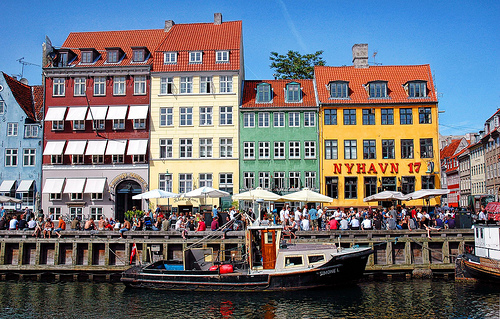Learning the Social Customs of Denmark

Denmark is an egalitarian society, and the Danes are a modest people. Their language uses gender-neutral words. Most Danes do not show off their educational and professional accomplishments in front of others, and most people are more group-oriented.
In the work space, there are large maternity leave times for both men and women. Danish men are often more involved in the birthing process than are men in other countries. Danish women usually work, instead of being confined to domestic lives, and will expect to have equal payment, treatment and respect in the workplace. Mothers who work have an easy time arranging flexible hours with their careers so they can balance their careers with their families.
Families in Denmark are small and non extended. People often live in nuclear families. Children are brought up to be independent, which starts at an early age. Most children go to day care from the time they are a year old. Marriage is not a norm to starting a family. Many non married couples live together with their children, and this is commonly accepted.
Danes believe that people should act a proper way in social settings. Natives and foreigners are expected to speak in moderate tones, and not be obnoxious. People who call a lot of attention to themselves are looked down upon. Danes will openly tell people to act better if they are not being courteous.
In terms of meeting, Danes use a simple, firm handshake, with a smile and eye contact. It is common to shake hands first with women. You should shake hands with everyone individually when arriving or leaving a social setting. Danes usually introduce themselves with their first names.

If you are invited to a Danish house, you should bring a small present, such as flowers, or nice chocolates or wine. Flowers should be wrapped, and red is a good color for wrapping paper. You can send flowers in advance.
If you are going to a party, make sure to arrive on time, and check to see if you should take off your shoes. You should call in advance to see if they want you to bring a dish. Offer to help when they are setting up or cleaning. You should not discuss business matters at dinner.
Danes believe in proper table manners. You should wait to be seated, as the hosts may have designed a plan in advance. You should try everything you are offered, and expect to be offered second helpings (which you do not have to take up). You should finish all of your food, as Danes hate waste. When you complete your meal, you should put your fork down on your plate, with the tines up, and the handles to the right. Do not begin your meal until the host toasts with “Skol!” Raise your glass to your eye level, and look everyone in the eye who is seated near you.

This is a great article, informative. In addition to the content, you may also learn more about the people and the country of Denmark at MyDenmarkTV a weekly web TV show that give insights & practical tips about Denmark.
My great-grandfather arrived from Denmark around 1900. Not being the oldest son his economic future in Denmark was limited. The family farm goes to the eldest son. He arrived in a strong Danish community located in West Branch, Iowa, USA. In fact the majority of the danish immigration to America from the 1860s on settled in Iowa. The fact that Danes do not customarily discuss business at dinner, educational or career accomplishments with others is very much in line with my family traditions. I have found that America requires a little more “set yourself apart personality” and a lack of modesty despite Christian teaching of humility. This reserved posture I believe is a Germanic trait of “talk less do more” that marks much of Scandinavian and Germanic cultures. I think it is culturally significant that the economics of Scandinavia and Germany are doing so well and largely supporting the EU after the Wall St. fiasco. Maybe Wall St. should talk less and do more. I think Danish Flex-security is the most advanced economic model for modern economic governance.
I have to disagree with the way they present women in this articule..
Im an argentinian woman living in Denmark and find women here absolutely useless..
Literally 8 out of 10 women under the age of 30 are beauticians and with no prospect of getting a real job..funny enough even though they pretend to be intested in the beauty bussiness they pay no attention to their looks to the point people started at me if I walk around in high heels..
Also people here dont pay attention to table matters as many times they start eating before everybody is at the table..is also very often to people enter a room without say hi to everytbody there..
#Thad:
Please bear in mind that this was over 100 years ago, when Denmark was mainly an agricultural nation. This has changed.
#Di:
I have to disagree strongly with this, and you obviously seem a bit biased towards Danish women. Many women in Denmark take very long educations, some studying until they are 27 to 28. As such, it is very hard to maintain a “real” job while studying.
And while people perhaps doesn’t say hello, it is common politeness in Denmark. Sadly, common politeness is dying out over here.